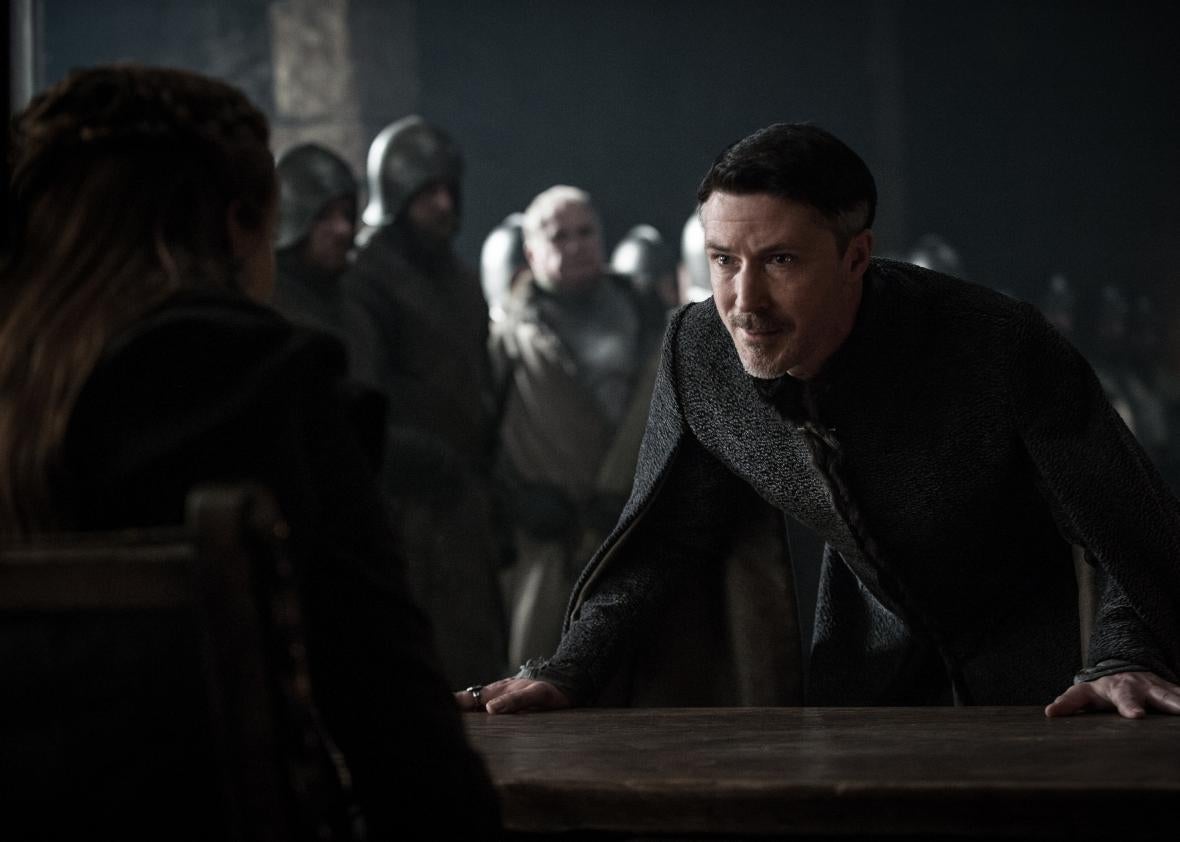Want to listen to this article out loud? Hear it on Slate Voice.
The late Tywin Lannister—Lord of Casterly Rock, Warden of the West, and Westeros’ best-known single dad—had many valuable lessons to impart. And if anyone was paying attention to the Lannister patriarch, it was his daughter, Cersei.
“You should have listened more when Father spoke about the importance of gold,” Cersei said to the “stupidest” Lannister, Jaime, during the Game of Thrones Season 7 finale, “The Dragon and the Wolf.” “I know it was boring for you. You just wanted to hunt and ride and fight. But I listened. I learned.”
It was not the first time Cersei has mentioned being a student of her father. “Do you think I listened to Father for 40 years and learned nothing?” she asked her twin in the season’s opening episode.
In fact, Cersei learned almost everything she knows from her shrewd father, despite the fact that he was usually more focused on his favorite son than his marriagable daughter. Tywin wasn’t perfect—he did, after all, instill enough hatred in his youngest son, Tyrion, to prompt him to put a crossbow bolt through his heart—nor did he always give Cersei the autonomy she felt she deserved. But Cersei knew there was wisdom to be gained from clever parents, even those with whom you don’t always see eye-to-eye. Tywin was clever indeed—he himself learned from the mistakes of his bumbling own father, understanding the importance of gold and of being ruthless with one’s enemies, bringing new meaning to “A Lannister always pays his debts” with the destruction of House Reyne.
The lioness doesn’t fall far from the lion. Sitting behind her father’s old desk—in the office usually reserved for the queen’s Hand, which the consummate schemer uses herself—Cersei is every bit her father’s daughter: cunning, opportunistic, and a master of the game. Despite the intensity of the queen-on-queen negotiations between her and Daenerys Targaryen, she was observant enough to notice a missing dragon, and prepared enough to have a secret strategy ready to deploy with the help of Euron Greyjoy.
Sansa is another woman who knows the value of learning from her elders—and knows that wisdom can be reaped from unexpected places. “Thank you for all your many lessons, Lord Baelish,” she tells Littlefinger, before having the sister he sought to turn her against slit his throat. “I will never forget them.”
It’s doubtful she will. No one has proven better at learning lessons over the last seven seasons than the Lady of Winterfell, who has gone from naive and trusting pawn to shrewd, independent woman in charge. Having lost both her parents, Sansa has had to pick up tricks from all over the place. She’s learned from the good and the evil, but none more so than from her enemies and the greatest schemers in the game, Littlefinger and Cersei—from whom, she tells Jon, she “learned a great deal.” All of these lessons, however, remain underpinned by the teachings of her father Ned Stark, whose memory and lessons brought her and her sister back together this episode. “In winter we must protect ourselves, look after one another,” says Arya. Sansa continues Ned’s lesson: “When the snows fall and the white winds blow, the lone wolf dies, but the pack survives.”
Many of Game of Thrones’ characters had fathers there to teach them, at least for a little while. Others were not so lucky. Theon Greyjoy grew up in Winterfell, far from his ironborn father, and when he returned to the Iron Islands he was thought to be soft. It was his need to impress his father that led him to betray his “real” family, the Starks. But Theon always had a surrogate father in Ned, and it’s clear from his conversation in the finale with Jon—another man with confused parentage, although he does not yet know it—that their father’s influence is still there: Theon is a Greyjoy and a Stark, just as Jon is a Stark and a Targaryen.
“Our father was more of a father to you than yours ever was,” Jon tells his surrogate brother. “You never lost him. He’s a part of you. Just like he’s a part of me.” In “The Dragon and the Wolf,” Theon did take one postive lesson from his salt and iron blood—not from his father but from his fierce sister. It is the combination of Yara, Jon, and Ned’s influence that helps him to find the courage to try to save her.
This episode also saw two rival surrogates put their differences aside to marvel at the advancement of their shared protégée. Last time they saw one another, Brienne and the Hound tried to kill one another for the right to protect Arya Stark; now, she’s outgrown them both. The Hound wants to know who is looking after her in Brienne’s absence. “The only one who needs protecting is the one who gets in her way,” she says proudly of their pupil.
At its heart, Game of Thrones has always been a story about families. There have been great heads of houses and cruel ones, smart ones and moronic ones. But the best players have been willing to learn from anyone, be they friend, foe, or father.
